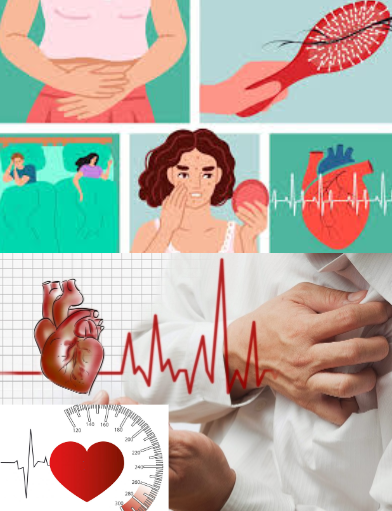
High blood pressure, also known as hypertension, is a common but dangerous condition that affects millions of people around the world. It is often referred to as the “silent killer” because it typically has no noticeable symptoms, yet it can lead to serious health complications like heart disease, stroke, kidney failure, and vision loss if left untreated. In fact, many people with high blood pressure don’t even realize they have it until they experience severe health issues. This is why it’s essential to be aware of the signs and symptoms that could indicate hypertension.
In this article, we will explore the symptoms of high blood pressure, how it affects the body, and why early detection is so crucial for maintaining long-term health.
What Is High Blood Pressure?
Blood pressure refers to the force of blood against the walls of your arteries as your heart pumps it around your body. When blood pressure consistently stays high over time, it puts extra strain on your heart and blood vessels. Hypertension is typically defined as having a blood pressure reading higher than 130/80 mm Hg.
High blood pressure can be caused by a variety of factors, including poor diet (especially a high salt intake), lack of physical activity, obesity, stress, smoking, excessive alcohol consumption, and genetic factors. Additionally, certain conditions like kidney disease, diabetes, and hormonal disorders can also contribute to hypertension.
Why High Blood Pressure Is Dangerous
High blood pressure can damage your blood vessels and organs, even if you don’t experience noticeable symptoms. Over time, it increases the risk of heart attack, stroke, kidney damage, and eye problems. The longer blood pressure stays elevated, the more likely it is to cause severe health issues.
Unfortunately, many people with hypertension do not show symptoms until serious damage has been done. This is why it’s important to get your blood pressure checked regularly, especially if you have a family history of hypertension or other risk factors.
Common Signs and Symptoms of High Blood Pressure
Although high blood pressure is often asymptomatic, some people may experience certain symptoms that can signal a problem. These symptoms, however, can vary from person to person and may be mild or even go unnoticed. Here are the most common signs and symptoms that could indicate high blood pressure:
1. Headaches
Frequent headaches, particularly those that feel throbbing or intense, can be a sign of high blood pressure. If you experience headaches along with other symptoms, such as dizziness or blurred vision, it’s important to get your blood pressure checked. The severity of headaches associated with high blood pressure is often worse in the morning, although they can happen at any time of the day.
2. Dizziness or Lightheadedness
Dizziness or feeling lightheaded is another potential sign of hypertension. It may occur when you stand up too quickly, but if it happens frequently or without any obvious triggers, it may indicate that your blood pressure is too high. Dizziness can occur as a result of the strain high blood pressure puts on your circulatory system, affecting your blood flow to the brain.
3. Shortness of Breath
If you find yourself becoming easily short of breath with normal activity, it could be a sign of high blood pressure. This can happen because hypertension causes the heart to work harder, which may result in fluid buildup in the lungs (pulmonary edema) and difficulty breathing. Shortness of breath is a serious symptom that requires immediate medical attention.
4. Chest Pain or Pressure
Chest pain is a serious symptom that should never be ignored. If you experience chest tightness or pressure, it may indicate a heart attack or angina (reduced blood flow to the heart). Both of these conditions can be linked to high blood pressure, which places added strain on the heart and blood vessels. If you experience chest pain, seek emergency medical care immediately.
Video : Causes of High Blood Pressure
5. Blurred Vision or Seeing Double
High blood pressure can cause damage to the blood vessels in the eyes, leading to blurred vision or even vision loss in severe cases. If you notice changes in your eyesight, such as seeing double or difficulty focusing, it could be a sign that your blood pressure is dangerously high. This is why regular eye exams are crucial for people with high blood pressure.
6. Nosebleeds
Frequent nosebleeds are another potential symptom of high blood pressure. While nosebleeds can be caused by various factors, such as dry air or allergies, high blood pressure can make blood vessels in the nose more susceptible to breaking, leading to frequent or spontaneous nosebleeds.
7. Fatigue
If you feel unusually tired or fatigued even after getting enough sleep, it could be a sign that your heart is working harder than it should be due to high blood pressure. Over time, the increased workload on the heart can lead to heart failure, a condition in which the heart is unable to pump blood effectively. Fatigue is one of the early warning signs of heart-related issues caused by hypertension.
8. Blood in the Urine
High blood pressure can damage the kidneys, leading to a condition known as hypertensive nephropathy. This condition may result in blood in the urine or changes in urine color. If you notice that your urine appears pink or red, it’s essential to consult a healthcare provider for an evaluation.
When to See a Doctor
If you experience any of the above symptoms, it’s important to consult a healthcare provider as soon as possible. Although high blood pressure is often called the “silent killer” because it can go unnoticed, regular blood pressure checks can help catch the problem early.
You should see a doctor immediately if you experience:
- Severe chest pain or tightness
- Difficulty breathing
- Loss of vision or blurred vision
- Severe headache or dizziness
- Nausea and vomiting with headache
Even if you don’t experience symptoms, it’s important to get your blood pressure checked regularly, especially if you’re over 40, overweight, or have a family history of hypertension.
Managing High Blood Pressure
If you’re diagnosed with high blood pressure, there are several ways to manage the condition and reduce the risk of complications:
- Lifestyle Changes: Adopt a healthier diet, exercise regularly, reduce salt intake, limit alcohol, and quit smoking.
- Medications: Your doctor may prescribe medications to help lower your blood pressure, such as diuretics, ACE inhibitors, or beta-blockers.
- Stress Management: Practicing relaxation techniques, like meditation or yoga, can help reduce stress, which is a major contributor to high blood pressure.
Video : 10 Warning Signs of High Blood Pressure You Shouldn’t Ignore 🚨
Conclusion
High blood pressure is a serious condition that can have life-threatening consequences if left untreated. However, recognizing the signs early and getting regular blood pressure checks can help you manage the condition and prevent complications. If you experience any of the symptoms mentioned above, it’s crucial to seek medical attention immediately. By adopting a healthy lifestyle and following your doctor’s recommendations, you can keep your blood pressure in check and maintain a long and healthy life.


